For the latest installment of my The Farmer & the Florist interview series, I’m thrilled to welcome Rosebie Morton of The Real Flower Company. If you’re not already familiar with this UK flower superstar, you are in for a real treat. First, here’s a little background on Rosebie:
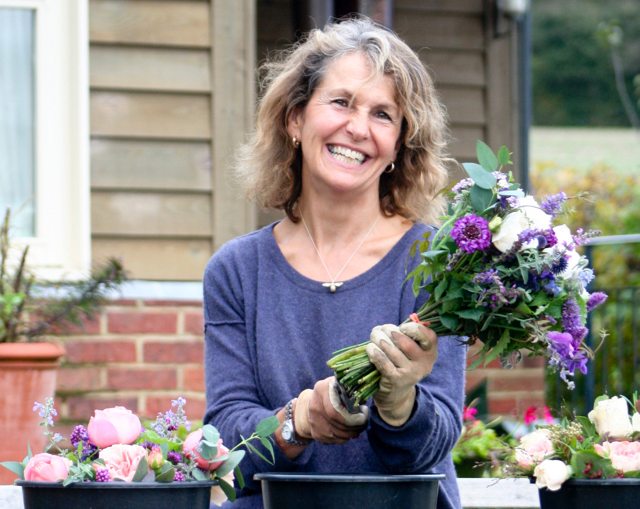 Inspired by her memories of her mother’s English country gardens, Rosebie planted her first rose bushes in the early 1990’s, a time when the market was being flooded with stick-straight scentless commercial flowers. Selling at the Covent Flower Market, Rosebie developed a loyal following of flower enthusiasts who appreciated the natural charm and heavenly scent of garden roses, what she describes as “real” flowers. Rosebie’s business grew quickly and in 1998, she co-founded The Real Flower Company, which specializes in bouquets of fresh garden roses, perfumed flowers, herbs and unusual foliage. The Real Flower Company now ships luxurious seasonal bouquets all across the UK—including some that come in the adorable little hatboxes.
Inspired by her memories of her mother’s English country gardens, Rosebie planted her first rose bushes in the early 1990’s, a time when the market was being flooded with stick-straight scentless commercial flowers. Selling at the Covent Flower Market, Rosebie developed a loyal following of flower enthusiasts who appreciated the natural charm and heavenly scent of garden roses, what she describes as “real” flowers. Rosebie’s business grew quickly and in 1998, she co-founded The Real Flower Company, which specializes in bouquets of fresh garden roses, perfumed flowers, herbs and unusual foliage. The Real Flower Company now ships luxurious seasonal bouquets all across the UK—including some that come in the adorable little hatboxes.
In 2011, Rosebie and her husband bought the infamous Greenlines Nursery, the largest sweet pea grower in the UK. With 1.5 acres of glasshouses, the Nursery now supplies sweet peas to The Real Flower Company for their online business and trade customers.
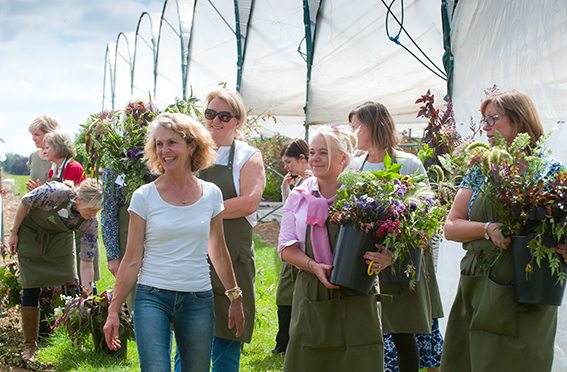
Throughout the summer Rosebie, offers tours, workshops and “morning walks” through her gardens, where she conducts trials on different flowers. Rosebie Morton’s “Rose Paddock” is on my bucket list of places to visit whenever I finally make it to the UK. Until then, however, I’ll have to be satisfied with staring at the photos she has graciously shared. I’ve long admired Rosebie’s work and business acumen and I’m thrilled to have her sit down with me to share some insights from her many years of working with seasonal flowers—specifically sweet peas and garden roses.
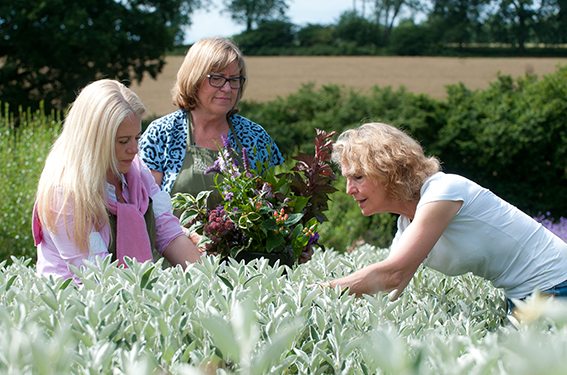 Erin: You’ve accomplished quite a lot over your career and what you are doing is such an inspiration to so many growers there and here in the U.S., as well. With the acquisition of Greenlines Nursery, your business has grown considerably over the past five years. I’d love to know more about your vision for the future and the seasonal flower movement there in the UK.
Erin: You’ve accomplished quite a lot over your career and what you are doing is such an inspiration to so many growers there and here in the U.S., as well. With the acquisition of Greenlines Nursery, your business has grown considerably over the past five years. I’d love to know more about your vision for the future and the seasonal flower movement there in the UK.
Rosebie:To re-educate the nation that the only roses to buy are scented roses and to dispel the theory that roses are a nightmare to grow – everybody needs scented roses in their gardens as well as in their houses. The British don’t wake up until Chelsea Flower Show and there is suddenly huge demand for all things British including garden roses and sweet peas. Our orders at the Real Flower Company suddenly go crazy and then there is a mad buying frenzy until the first week of the school holidays (middle of July) and then every man and his dog disappear for their summer holidays, reappearing in the first week of September. Meanwhile we are sitting on a tsunami of beautiful roses and other flowers with no decent market!
Erin: As you may know, sweet peas are one of my favorite flowers and I’ve published numerous blog posts dedicated to growing these fragrant blooms. I’m curious to know how similar or different your production techniques are compared to ours. Any insights you care to share?
Rosebie: We grow our sweet peas are under glass and they are grown up cordons, similar to tomatoes – not sure how it is done in the US so hard to compare.
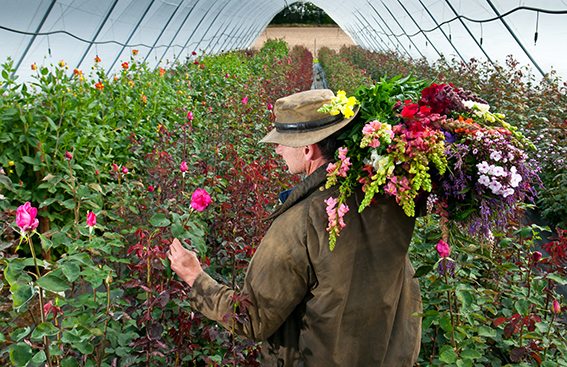
Erin: I admire the effort you and your company have made to grow all of your flowers ethically, seasonally and sustainably. I noted that your website mentions that major changes to growing methods have led to a 60% reduction in energy used to grow the crop. What are ways have you managed to accomplish this?
Rosebie: We have virtually stopped heating the greenhouses. Sweet peas can cope with quite low temperatures and so we are therefore saving considerable energy. We use a specialised paint to lower the heat in the summer therefore reducing the amount of energy used from turning on fans. We capture our water and we recycle all our packaging so that a box which has been used to carry sweet peas will be used at least three times.
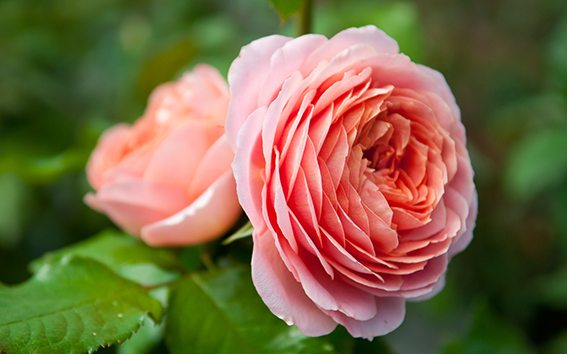 Erin: It’s a becoming an increasingly publicized fact that rose gardening in the U.S. is on the decline. Roses, especially hybrid teas, are disappearing from the American landscape often losing out to the better selling, low maintenance “Knock Out” rose. In an article in the LA Daily News earlier this year, “Gardening: Roses are drought-tolerant plants,” Joshua Siskin notes that in 1990 there were 50 million field-grown roses in the USA and today that number has decreased to less than 20 million. What is your reaction to this? What are the trends in the UK?
Erin: It’s a becoming an increasingly publicized fact that rose gardening in the U.S. is on the decline. Roses, especially hybrid teas, are disappearing from the American landscape often losing out to the better selling, low maintenance “Knock Out” rose. In an article in the LA Daily News earlier this year, “Gardening: Roses are drought-tolerant plants,” Joshua Siskin notes that in 1990 there were 50 million field-grown roses in the USA and today that number has decreased to less than 20 million. What is your reaction to this? What are the trends in the UK?
Rosebie: There is a huge amount of smoke and mirrors about growing roses and the complexity around them; I am trying to dispel this theory and help people understand that roses are really very easy to grow and well worth taking the initial trouble to plant them correctly. Once established, many older roses can survive with very little water although the head size might suffer accordingly.
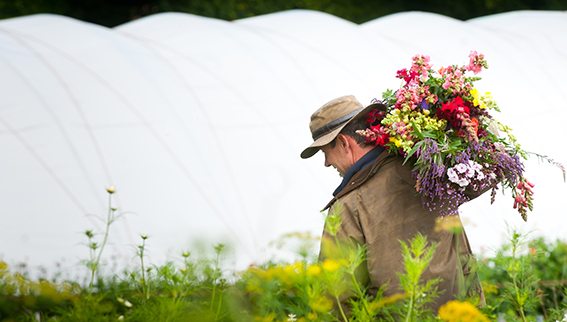 Erin: I’m hoping we might be able to spark a little rose revival here among farmer-florists (perhaps with this interview we can catalyze some change on a small scale). While micro flower farms are on the rise, most are focused on flowers other than roses. I have to admit, roses have only more recently found a dedicated place within my cutting garden, and I feel like I still have a lot to learn. I have a number of growing-related questions, so I hope you might indulge me.
Erin: I’m hoping we might be able to spark a little rose revival here among farmer-florists (perhaps with this interview we can catalyze some change on a small scale). While micro flower farms are on the rise, most are focused on flowers other than roses. I have to admit, roses have only more recently found a dedicated place within my cutting garden, and I feel like I still have a lot to learn. I have a number of growing-related questions, so I hope you might indulge me.
Ok, here goes: I have limited space and I need to grow all my flowers intensively. Like you, we have a very rainy climate. Are all of your roses under cover or are some field grown? It looks like you utilize a lot of hoophouses, or unheated high tunnels that I believe you call Haygrove tunnels, is that right? What kind of spacing do you use do use? (The photos I’ve seen suggest they are planted pretty close together).
Rosebie: Most of our roses are grown under polytunnels and they are called Haygrove. They are planted about 30 cms apart and the tunnels are removed for the winter, exposing the roses to the wet and cold!
Erin: Aha! Very interesting! What other flower crops you prioritize for your polytunnel production?
Rosebie: Hydrangea Paniculata, Dahlias and some Geraniums.
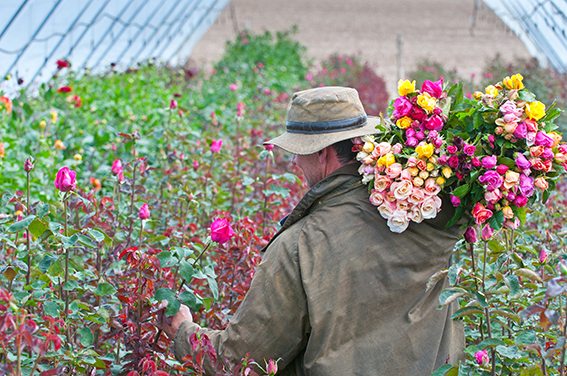
Erin: What is your best advice for gardeners and farmer-florists considering adding roses to their lineup of seasonal flowers? If you had to pick 5 roses to start with, what would they be?
Rosebie: I would say that my best advice would be to prepare the ground really well before you plant them, incorporating lots of muck and choose some strong growing varieties. One of my favourite breeders is Harkness so I would be growing Chandos Beauty and Margaret Merrill which are two of his. Also Princess Alexandra (Poulsen), White Gold (Cocker) and Evelyn (David Austin)
Erin: I love the calendar feature on your Rosebie Morton website and how there’s a rose care tip for each month. In January, you mention applying a “winter wash.” Can you share more about this–what you use and the benefits of applying the winter wash?
Rosebie: A Vitax winter wash which is a blend of natural plant and fish oils which controls over-wintering spores etc. such as blackspot.
Erin: I’m always interested in learning about other flower growers’ favorite fillers and foliages for mixed bouquets. What are a few of your favorite varieties?
Rosebie: I love a multitude of herbs such as rosemary, lavender, scented geranium, mint, sage. Also Senecio, Pysocarpus Diablo and as many salvias as I can find.
Erin: Excellent. Rosebie, THANK YOU so much for taking the time out of your busy schedule to share your experience and expertise with me and my blog readers. I’ve learned a lot from our conversation and I do hope to meet you in person someday soon.
Rosebie: Pleasure and thank you for inviting me! We have had several parties of American ladies visit us here for the day as part of their UK tour – we absolutely love them and so if any of your readers would like to organise a group and come and visit us they would be very welcome!
Learn more and connect with Rosebie:

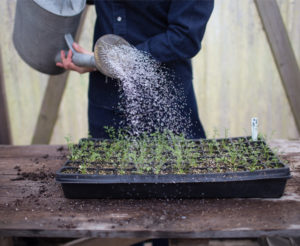
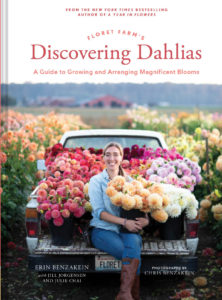
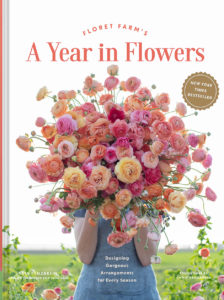
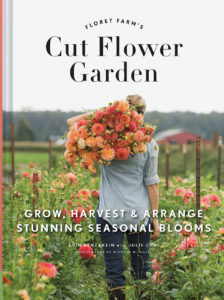

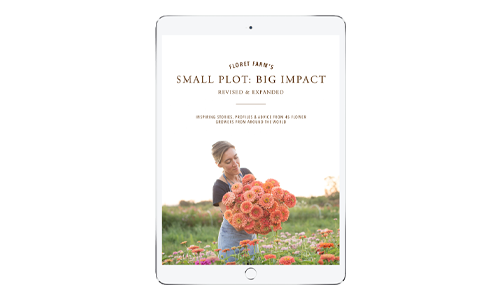
Plastic free on
This woman is NOT environmentally friendly. She uses miles of nylon twine to support her sweetpeas, which she sends to landfill every season along with tons of plastic wrapped rockwool. She also delivers her peas in plastic cups and wraps her roses in plastic. She also treats all her produce with STS solution which is very harmful to marine life. She is far from a UK flower superstar!!!